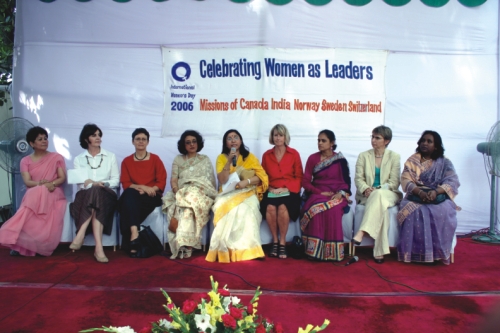|
Event
Reaching for new heights
Hana Shams Ahmed
One thing women all across the world have to face to get to leadership positions is the tacit opposition they face from the men. Therefore although a deserving male candidate may easily get the support of his male and female colleagues to get to the top position, an equally deserving female candidate will have to prove her worth and commitment to a much larger extent than him.
Unfortunately the power struggle at the corporate level is not the only thing a woman has to worry about. In most cases she also has to achieve a fine balance of family and work to feel completely successful. So it is an understatement to say that women have to overcome far more difficult challenges than a man to get to leadership positions.
To commemorate International Women's Day, the heads of missions of Canada, India, Norway, Switzerland and Sweden hosted a special event at the Canada club on March 6, 2006. The theme of the event was to highlight this commonly overlooked area of women's involvement in society, that is, women in leadership positions.
In Bangladesh although most women are still in a very disadvantaged position, there are many who have taken up praiseworthy leadership roles despite coming from very adverse circumstances.
The event of 6th March brought together many such successful women leaders to discuss how more women could take up such roles and how they overcame their personal challenges to get to where they are now.
Apart from the heads of five missions, there were also three women leaders who had chosen unconventional areas to demonstrate their leadership skills. Najma Akhter, a trade union leader in the garments industry, Dr. Hyat, an elected Poura Shava Chairman and Rokia Rahman, a well-known business personality. Besides the panellists women leaders from a variety of sectors were invited to take part in the discussion programme.
Shaheen Anam, the team leader of Manusher Jonno reminded everyone about the significance of the history of the women's movement in Bangladesh which involved such revolutionary women ('sheroes' as opposed to heroes) as Begum Rokeya, Pritilota, Sufia Kamal, Noorjahan Begum etc. and many before and after, who continue to strive for equality, justice and opportunity for the women of the country.
"Women's economic empowerment, participation in public life, increase in labour force, school enrolment, decrease in maternal mortality are all achievements that we acknowledge", she added. However she also admitted that even now women face many barriers at home and in the society and that there is a long way to go.
Veena Sikri, the ambassador of India speaking about whether the present growth of her country had an impact on women's empowerment said that India was the biggest paradox in this case. "On the one hand we have constitutional equality for women and on the other there is large-scale exploitation and oppression." She agreed that dowry is still a big problem in India but in recent times many parents are realising that the best dowry they can give to their daughters is a good education. She also added that the media can play a big part to eliminate social taboos and barriers that prevent women from excelling in all areas.
Speaking about how the economic condition of her country has affected women, the ambassador of Norway Aud Lise Norheim said that affluence has encouraged women to take up leadership positions which have in turn given rise to more day care centres.
The Swedish ambassador Britt Flagstrom also spoke about day care centres and how in her country a combined maternity leave for both parents encourages men to get involved with bringing up a baby.
The Swiss ambassador Dora expressed her disappointment at the fact that girls today take their freedom for granted and said that if the current generation does not appreciate the struggle that has taken place to come to this position what has been achieved so far maybe lost very soon.

The Canadian ambassador Barbara Richardson, who is a mother of young children, said that it has been very difficult to juggle home and work but she believes that supportive employers and understanding from society as a whole can help a woman enormously when the going gets tough. She believes that women can bring creativity and intuition into and organisation. Rokia Rahman presented the condition of Bangladeshi women in a positive light. "I have worked with women in villages and I was surprised to see how intelligent they are about starting their own business. They seem to know exactly where to invest their money in to get the best return," she said.
Najma Akhter who joined as a garments worker when she was only 11 years old said, "I decided to become a trade union leader because although 75% of the garment workers are women, they are represented by a male dominated union. I want to establish the fact that we are workers first and women second." She expressed her anger although they were working side by side with the men very late at night their work was not equally recognised as men.
Important points were raised at the discussion. One was that women must be recognised, appreciated and supported in their productive as well as reproductive roles. Women must also be able to actively participate in public life and making decisions. Women must also be ensured a violence-free environment at home and outside. Laws that discriminate and perpetuate male preference must be repealed. A uniform family code for all women must be established.
Copyright
(R) thedailystar.net 2005 |
